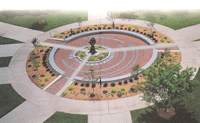
Alpha Larsen Pepper
is honored with a Brick from Louis J. Medvene, Ph.D.
My mother Alpha Larsen Pepper was considered by many to be a heroine because she pursued a career at a time when most women did not do so. But she saw her life in other terms and when she was asked, on entering a retirement home, to list what she was proudest of, she stated: "That I had a happy marriage and family."
My mother was born September 4, 1904 in Waterloo, IA. In 1920, at age 16 she left for college in Cleveland, OH and the lights of a big city. Following college, she entered the police force eventually attaining the rank of captain the highest ranking female officer at the time. Characteristically, she described this career choice in practical terms: it was the highest paying job she could find. She would have preferred to go to law school.
During this time she met my father - in jail. He was a chaplain there to visit a woman prisoner. She was on duty. She thought him a "do gooder." Following the police force, my mother moved to New York City to obtain a social work degree, again for practical reasons - she was on the wrong side of a political struggle. Social work proved to be a good fit, and she spent most of the rest of her professional career as a professor at the Columbia University School of Social Work. Her specialty was casework and she especially enjoyed teaching beginning and night students. Years later, when I was also a social worker in New York, I would often run into people who would say "Are you Mrs. Pepper's daughter? She was my teacher and I still remember that she taught me..."
She was also a model in another way. She was a large woman, something she was quite unhappy about, but in a time when clothing in her size ran to flowery dresses, she always wore tailored suits. She told me with pride that one of her students had said that she had shown her that "a big woman could look good."
When I was about eight, I really wanted my Mom to stay home with me and, amazingly, she left her job to do so. However, she was a woman of boundless energy, so my fantasy of a mother devoting her attention solely to me was not to be. First she joined the PTA. Then she became its president. Next she ran for the school board and was elected to it. Now she was home all day and out at meetings at night. When she broached the subject, a few years later, of possibly working again, I agreed that it would be a good idea. One of my biggest regrets is that she died soon after I was married and before I had found my own career path. I'm sorry that I never got to tell her that I had come to understand how much she gave up for me and how much I appreciated it.
My mother loved to tell stories and had a wonderful sense of humor. She was affectionate and loving. She had a wealth of silly expressions and nicknames. And she had a wonderful hearty laugh. My next door neighbor told me that, for her, the essence of summer was my mother's laughter floating up from our screened porch on summer nights.
In her early seventies, after my father's death, my mother suffered a severe stroke which left her partially paralyzed and confined to a wheelchair. Although she was straightforward about the fact that she hated the situation, she bore it with good grace. However, I never heard her laugh again.
My mother was a heroine in the simplest of ways. She always tried to do what needed to be done in the best possible way. She was loving and generous and kind. She was intelligent and energetic and capable. She loved people more than things and she was a delight to be with. She took herself and others seriously, but she was lighthearted. She was a wonderful woman.
September 15, 1998










